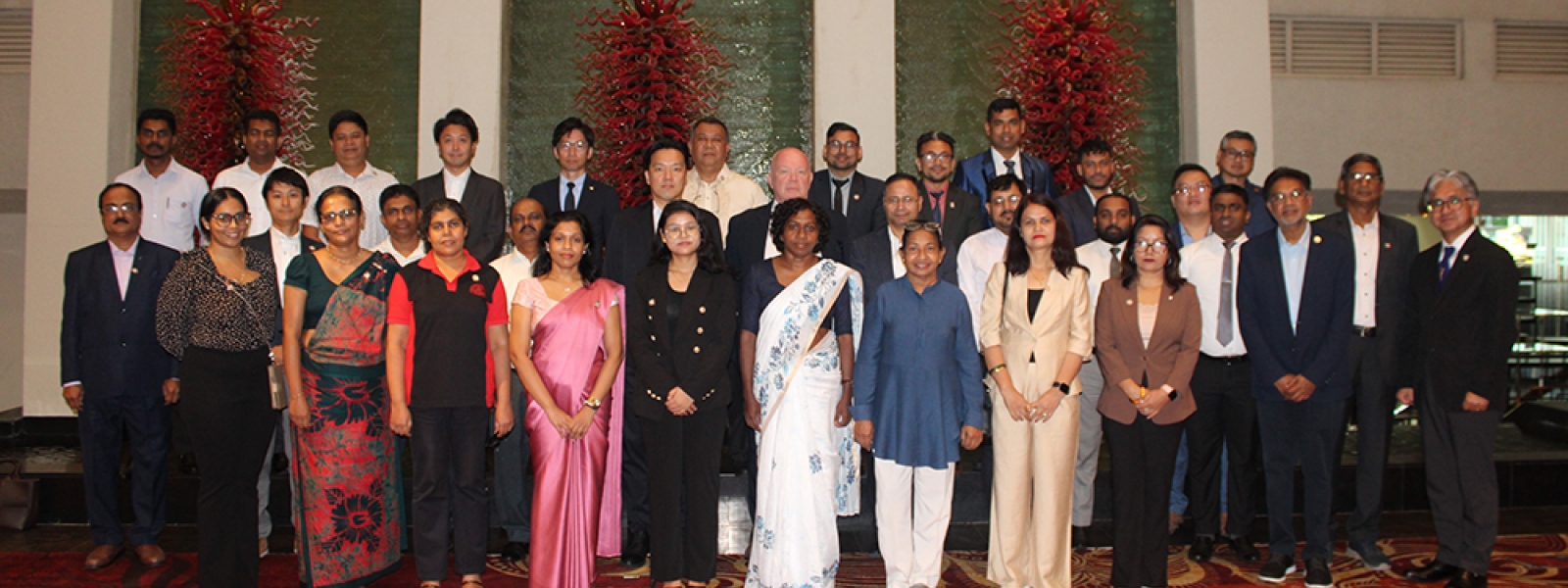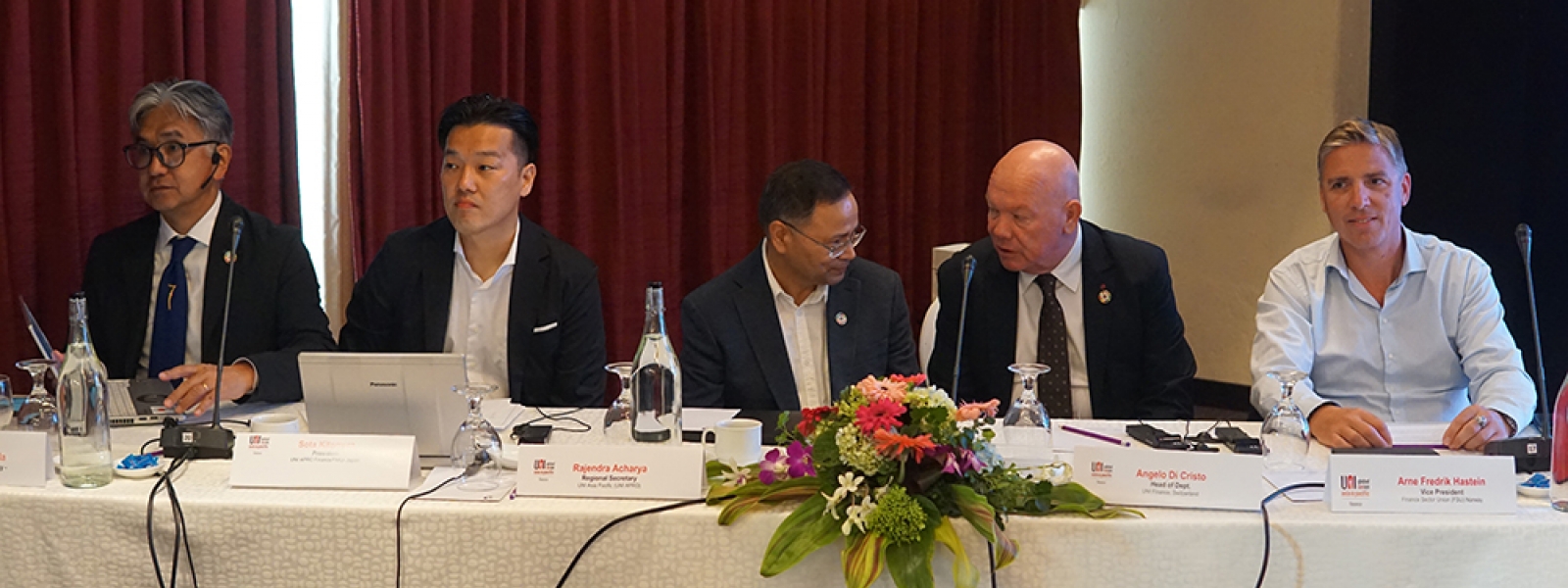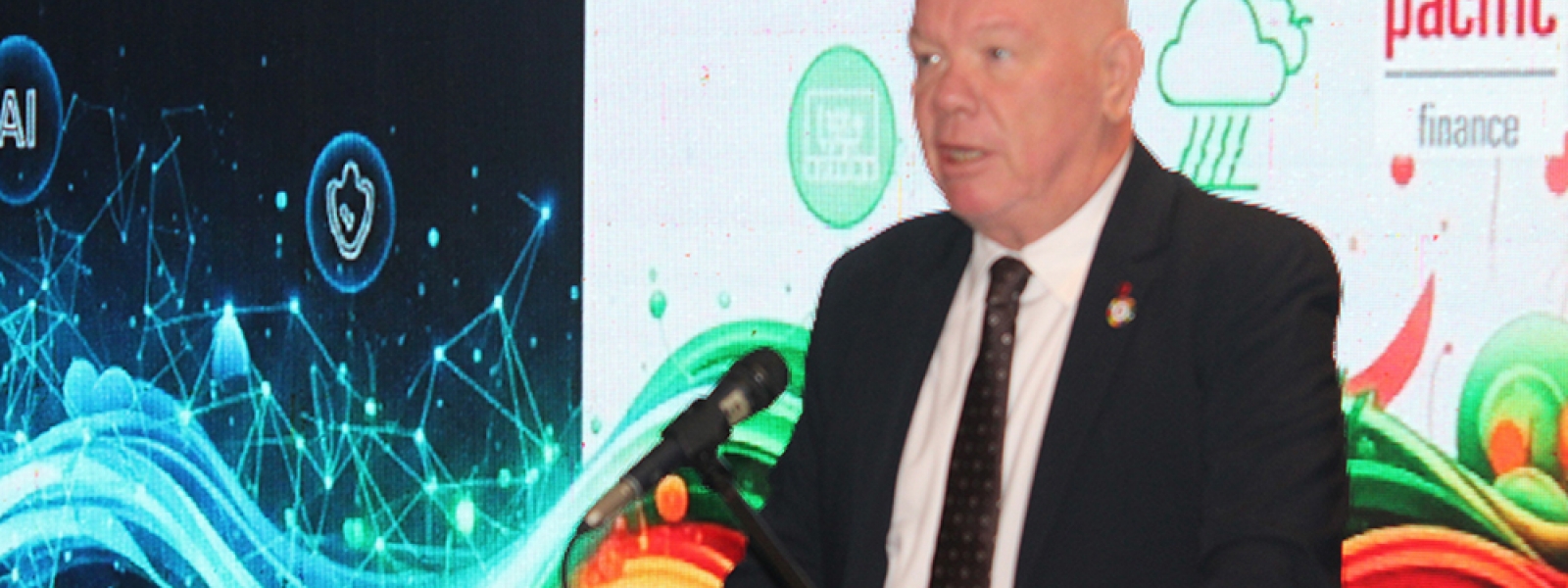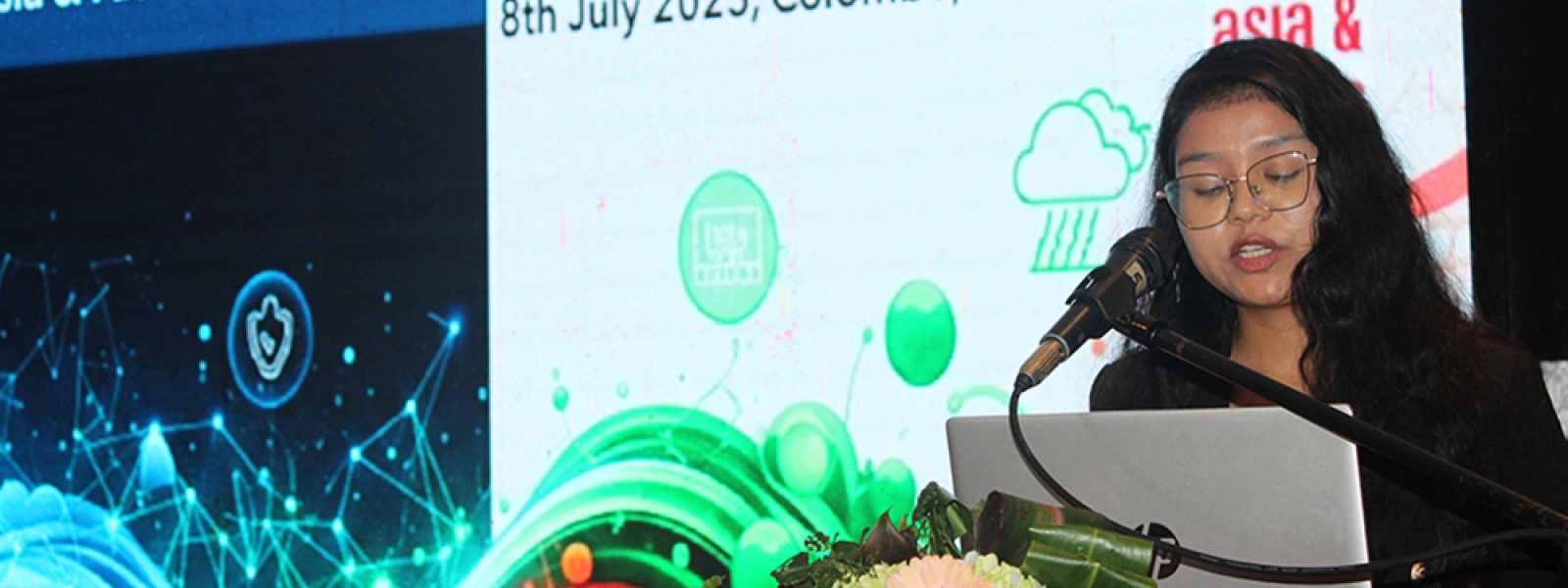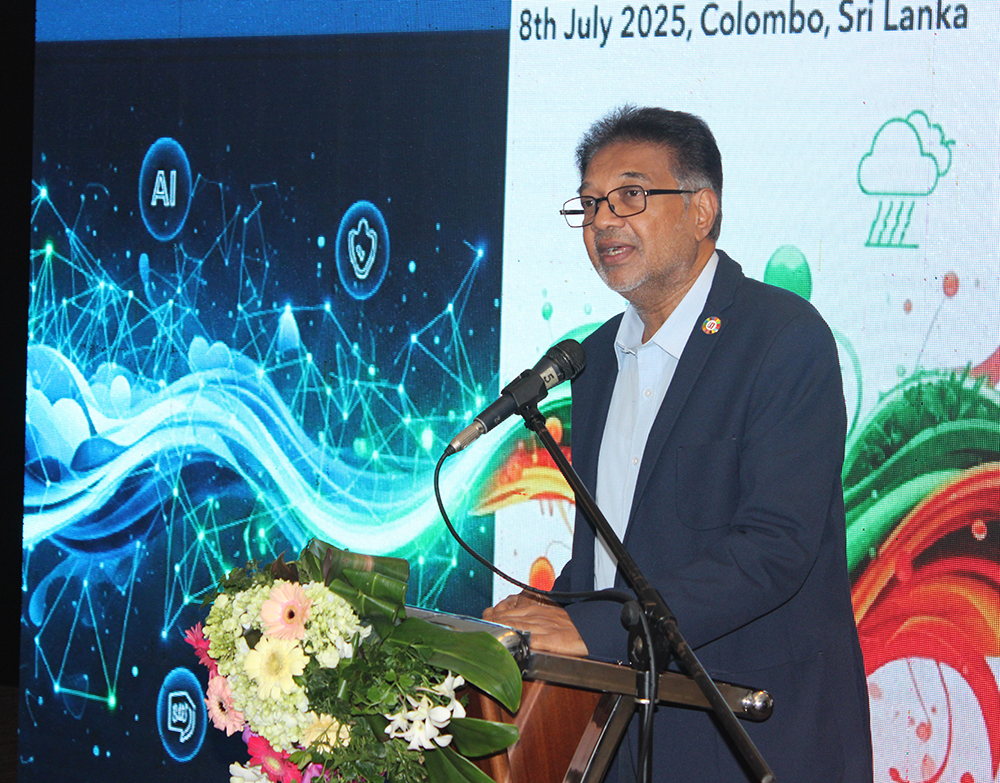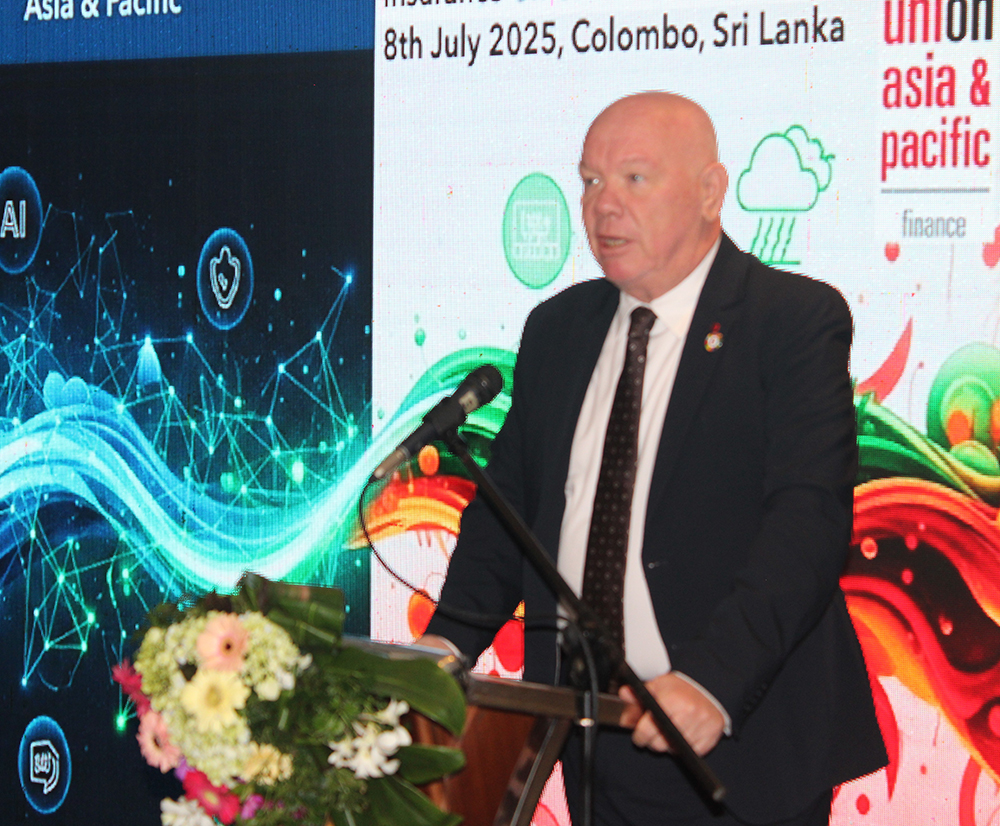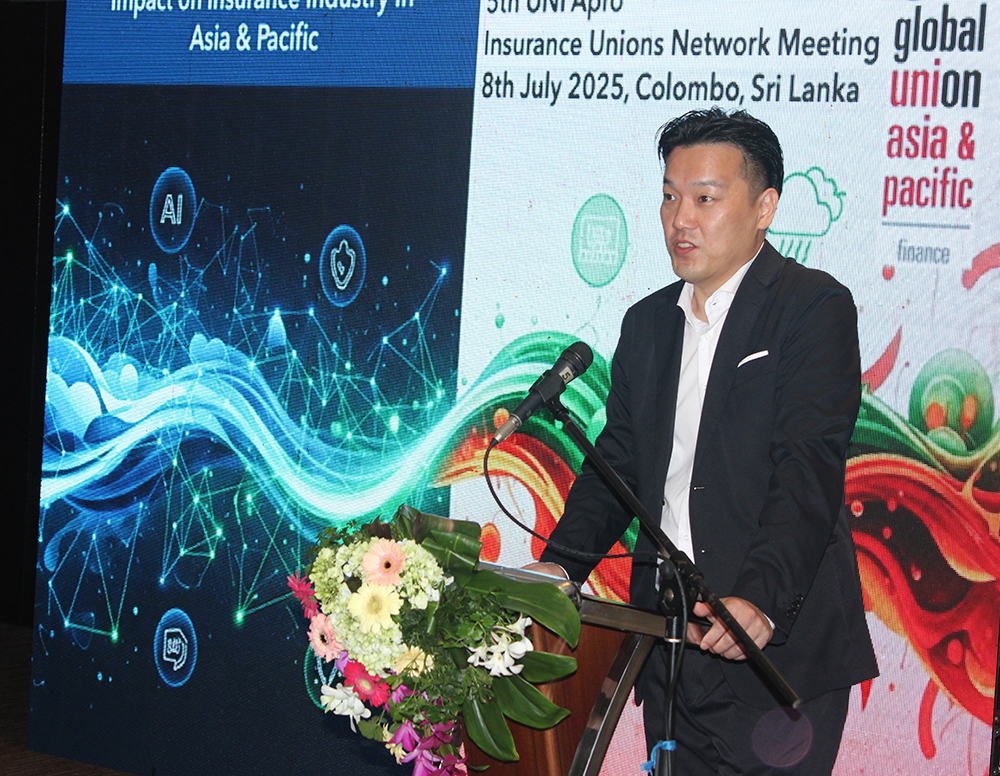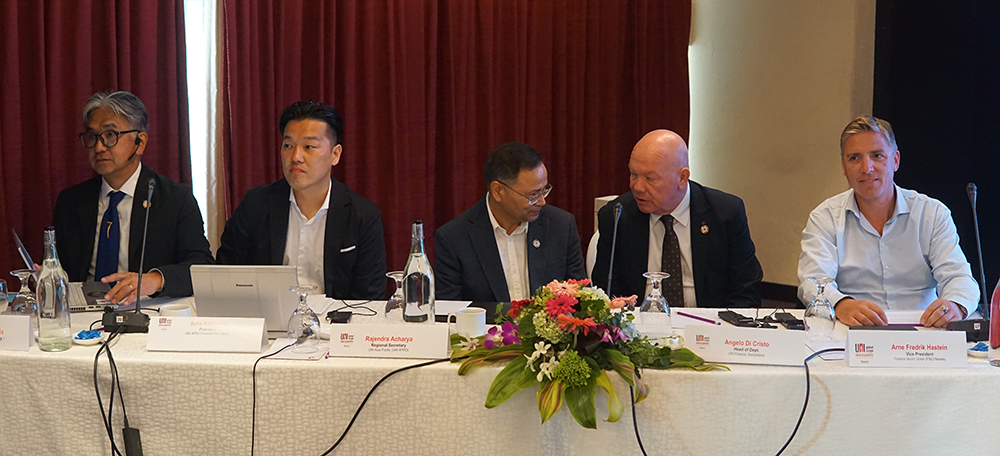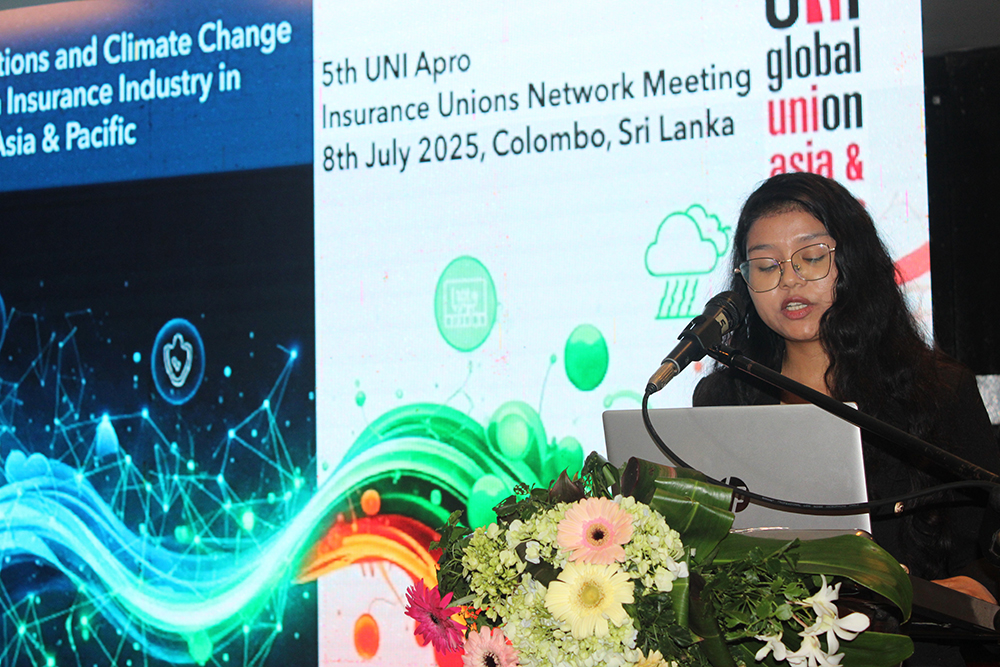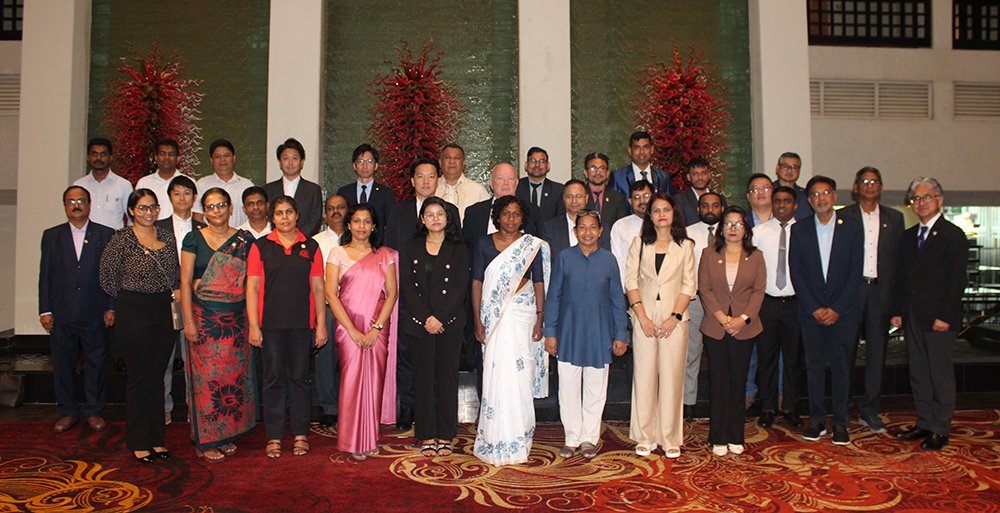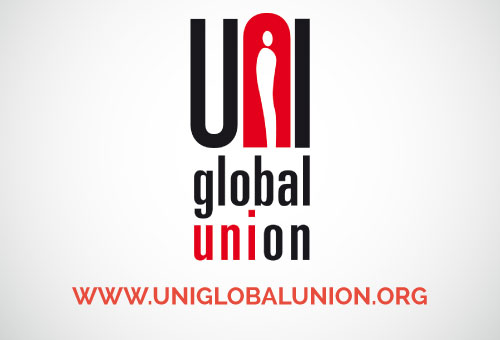Digital Disruptions and Climate Change Impact on Insurance Industry in Asia & Pacific
5th UNI Apro Insurance Unions Network Meeting
8th July 2025 | Colombo, Sri Lanka
Welcome and Opening Remarks
The 5th UNI Apro Insurance Unions Network Meeting, held at the Cinnamon Grand Hotel in Colombo, Sri Lanka, on July 8, 2025, brought together key figures to discuss the future of the insurance industry. The event aimed to address the critical challenges facing the sector and foster stronger solidarity among unions.
The meeting commenced with a warm welcome and insightful opening remarks from key figures, setting the stage for crucial discussions on the future of the insurance industry. Mr. Jayasri Priyalal, Regional Director of UNI Apro Finance Sector, extended a welcoming address to all participants, noting the significance of the meeting, held after a considerable gap, describing it as taking place "at a very critical stage" for deliberating the relevant and challenging issues facing the insurance industry.
Mr. Jayasri Priyalal, Regional Director, UNI Apro Finance Sector
Mr. Ranjan Senanayake, General Secretary of the Ceylon Bank Employees’ Union, expressed immense pleasure and deep solidarity in welcoming participants to Colombo, Sri Lanka, on behalf of UNI Finance Steering Group and the Ceylon Bank Employees’ Union. He stated, "Your presence here today is a testament to your unwavering commitment to the rights and welfare of workers and to the strength of our collective commitment".
Mr. Angelo Di Cristo, Head of Department at UNI Finance, Switzerland, expressed his happiness to be present and underscored the strategic importance of the insurance sector for finance. He emphasized the necessity of establishing a strong network in the region for solidarity across borders. In a candid remark, he addressed the gender imbalance in the meeting, stating, "It's not possible to have a meeting without female presence... This will be the last time that I will attend a meeting where there is no female presence". He further elaborated, "Solidarity is also among gender".
Mr. Angelo Di Cristo, Head of Department, UNI Finance, Switzerland
Mr. Arne Fredrik Håstein, Vice President of the Finance Sector Union, Norway, shared insights from the FSU Norway, highlighting its strength as the largest union in Norway's finance sector, representing over 60% of employees. He emphasized that "size really does matter," enabling the union to influence government, politicians, and companies. Addressing the impact of AI, Mr. Håstein stated, "It's not about losing jobs to the AI, it's losing jobs to the workers that actually know how the AI works".
Mr. Rajendra Acharya, Regional Secretary of UNI Apro, echoed the concerns regarding female representation, stating that Mr. Di Cristo's remarks were "bit soft" and that the issue needs introspection. He described the meeting as a "critical moment for all of us to reflect, to reconnect and also to restart" in the face of profound changes in the insurance industry. Mr. Sota Kitamura, President of UNI Apro Finance, expressed his pleasure at the meeting being held after a 13-year hiatus, noting the dramatic changes in the insurance industry's environment since 2012. He acknowledged the benefits of new technologies like AI and blockchain in improving business efficiencies, but also raised concerns about "precarious work due to platform based works, errors in algorithmic decision making, an abusive use of personal data".
Mr. Sota Kitamura, President, UNI Apro Finance
Introductory Panel Discussion: Interconnected Challenges
The panel discussion, moderated by Maureen Hick (Regional Director, UNI Europa Finance), delved into the profound challenges facing the insurance industry due to digital disruptions and climate change. The speakers included Sota Kitamura (President, Federation of Non-Life Insurance Unions Japan), Prashanth Grover (CEO, Allianz Insurance Lanka Ltd.), and Arne Fredrik Håstein (Vice President, Finance Sector Union, Norway).
- Sota Kitamura (Japan): Highlighted Japan's vulnerability to natural disasters, noting that 7 out of the top 10 major typhoon and flood-related insurance payments occurred after 2014. He stressed that "Climate change is not just an environmental issue, but is affecting our industrial structure and the foundation of the insurance system and even the nature of the society that we live in".
- Prashanth Grover (Sri Lanka): Discussed key trends influencing insurance business models, including Generative AI impacting the entire insurance value chain, and the evolving consumer behavior leading to vertical and horizontal integration. He emphasized the accountability of insurers in fostering a sustainable society through protection, prevention, and sustainability (ESG).
- Arne Fredrik Håstein (Norway): Reiterated the necessity for the industry to adapt, stating, "you need to actually prepare for it. And it's sort of a license to play." He described the Norwegian model where "collaboration is key," and that trade unionists must be present at decision-making tables through social dialogue. He strongly asserted that "When unions are actually at the table, the future work becomes more inclusive, more ethical and more sustainable".
Discussants included Karuna Thapa (FIEUN Nepal), Yuta Uesugi (ROSAIROREN – Japan), Siti Hadijah Binte Ram Jan Din (SIEU - Singapore), and Shyam Sundar Mohapatra (GIOAIA - India). Karuna Thapa highlighted Nepal's growing insurance sector but also the "digital divide" created by digital adoption. Siti Hadijah Binte Ram Jan Din described SIEU's strong track record in advocating for workers' rights through a tripartite approach.
Presentation on Survey Study: Challenges, Changes from Digital Disruptions and Climate Change Outcomes of the UNI Apro Finance Survey Study on Insurance Sector
Jayasri Priyalal, Regional Director, UNI Apro Finance Sector, presented a summary of the survey findings, offering a comprehensive overview of the state of the insurance industry in Asia Pacific.
- Business Growth and Profitability: The survey revealed a mixed growth landscape with generally positive premium growth across most markets, though at varying rates.
- Improvements in Terms and Conditions of Employment (Trade Union Achievements): Significant progress was achieved in Australia (new Enterprise Agreements, guaranteed pay), India (recruitment of professionals, wage hikes), Japan (wage improvements, retirement age extension), Korea (employment security provisions), and Singapore (improved Collective Agreements, commitment to upskilling).
- Impact of Digitalization and AI: Widely adopted to enhance efficiency, but often leads to work intensification, burnout, and workforce reductions (e.g., India's decrease from 118,000 to 97,000 employees).
- Consultations between Social Partners for the Introduction of AI: Formal consultations with insurers regarding AI are non-existent in Australia, minimal in Bangladesh and Sri Lanka. Japan promotes AI with a focus on securing employment, while Korea has a model agreement requiring company-union agreement.
- Increasing Public Awareness on Insurable Risks – Climate Change: Climate crisis is increasing insurance premiums in Australia. Governments in Bangladesh, India, Japan, and Korea have launched initiatives to raise awareness. However, the Philippines, Singapore, and Sri Lanka show no significant enthusiasm or campaigns for climate-change related risks.
Mr. Priyalal summarized the potential, stating, "The insurance industry has better opportunities to survive than the banking industry because the banking industry is evolving with the new technology coming in. We really don't know the coins, cash notes, it will disappear soon." He also emphasized the untapped potential of organized labor: "India and China together should rule the world if it is real democracy. But we don't use that power because we are divided, fragmented. Robos will never come and fight for labour rights.So this is why we had been clamory to organize the private sector".
Focus Group Discussions: Envisioning Insights – Converting Threats to Opportunities
The afternoon session comprised two focus group discussions, allowing union representatives to share their experiences and success stories.
FGD: Life Insurance Industry Perspectives
- Sanjay Chakraborty (AINLIEF, India): Highlighted evolving challenges (gig economy, AI impact on job security) and opportunities (organizing non-traditional workers, upskilling).
- Katsuya Ichikawa (LIU, Japan): Detailed the shift of AI to full-scale implementation, primarily supporting sales and administrative operations. Stated that strict Japanese labor laws and collective bargaining agreements make large-scale layoffs due to AI unlikely.
- Diwakara Ethugala (IGEU, Sri Lanka): Outlined challenges like low public understanding of insurance and problematic agent commissions. Proposed solutions included integrating insurance education in schools and advocating for union inclusion in policy decisions.
- Debaki Karki (FIEUN, Nepal): Noted a "48% drop in direct employment from fiscal year 2022 to 2024" due to automation and company mergers. Advocated for upskilling in data analysis and micro insurance for vulnerable populations.
FGD: Success Stories from Insurance Industry Unions
- Lynnard Bodoso (NUBE-IFO, Philippines) - Presented by Joseph Ariel P. Ramirez: Highlighted challenges like delayed wage increases and discontinuation of benefits for Government Financial Institutions (GFIs) workers. Urged for solidarity support to address these demands.
- Rachika S Gajanayaka (IGEU, Sri Lanka): Shared a success story of her union at the Sri Lanka Insurance Corporation (SLIC), where they successfully advocated for the implementation of a Collective Agreement (CA) in 2010, leading to significant benefits and increased membership.
- Shakeel Ahmed (PBIFEF, Pakistan): Shared PBIFEF's success in 2018 when the government attempted to privatize State Life Insurance Corporation of Pakistan. With UNI Global Union's intervention, they achieved court rulings in the union's favor and the lifting of suspensions for leaders.
Working Group Established
The UNI Apro Insurance Unions Network elected a working group to develop a work plan for the network. This work plan will be presented at the 7th UNI Apro Finance Sector Conference. The working group, designed to have both area and gender balance, has been tasked with developing an action plan to strengthen insurance unions and boost collective bargaining.
Elected Members of the Working Group:
- India: Shyam Sundar Mohapatra (GIOAIA) - Co-convener
- Nepal: Karuna Thapa (FIEUN) - Co-convener
- Sri Lanka: G.M. Rachika Sripali Gajanayaka (IGEU SL)
- Pakistan: Shakeel Ahmed (PBIFEF)
- Singapore: Teo Hock Moh Nelson (SIEU)
- Philippines: Leen Lynnard D. Bodoso (NUBE-IFO)
- Japan: Tomoaki Ueda (Executive Secretary - UNI LC Japan)
- Korea: UNI Apro will ask the Korean Finance Sector Workers Union (KFSWU) to nominate one representative.
- Australia: UNI Apro will ask the Finance Sector Union - Australia (FSU) to nominate one representative.
The working group is expected to have several rounds of discussions and come up with a work plan in two A4 papers, outlining their aims, objectives, and goals. The deadline for delivering the work plan is September 15th.
Participants of the 5th UNI Apro Insurance Unions Network Meeting
Conclusion
The meeting concluded with a renewed call for action, solidarity, and strategic engagement to address the evolving landscape of the insurance industry. Mr. Priyalal underscored the importance of participants utilizing the information shared during the meeting for their negotiations and activities. He reiterated that "The insurance industry has better opportunities to survive than the banking industry" amidst the rapid technological changes. The establishment of this working group signifies a renewed commitment to active collaboration and shaping the future of work in the insurance industry, addressing challenges like digital disruptions and climate change through social dialogue and collective action.

